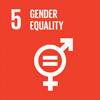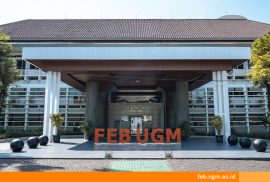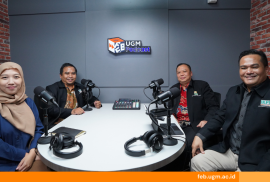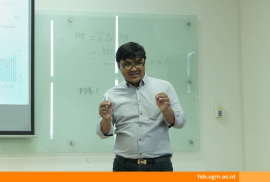
For those who aspire to become academics and researchers, the Master of Science in Accounting Program at FEB UGM offers a range of advantages to support your career journey. Through fast-track pathways from bachelor’s to master’s and master’s to doctoral levels, opportunities for national scholarships, and global exposure through a double degree program, this program is an excellent choice to accelerate your career transformation in both academic and professional spheres.
Fu’ad Rakhman, S.E., M.Sc., Ph.D., CA., Head of the Master of Science in Accounting Programme, explained that the programme strongly focuses on research methodology, theoretical reinforcement, and research skills to achieve scientific publication.
‘This programme is designed to turn graduates into researchers, professional consultants and, of course, leaders with a solid academic foundation,’ he stated in the ‘Master of Science in Accounting: Shaping Future Leaders, Researchers, and Professionals’ episode of the FEB Overview: Shaping Future Leaders, Researchers, and Professionals, which was recently broadcast on the FEB UGM YouTube channel.
Fu’ad further explained that the Master of Science in Accounting program has earned “Unggul” accreditation from LAMEMBA at the national level. Globally, the program is accredited by AACSB, placing FEB UGM among the top 6% of business schools worldwide.
Since 2023, the program has also introduced a new concentration in Data Science and Artificial Intelligence (AI) in response to industry demand for technology-literate accounting experts. In addition to this new focus, the program offers other concentrations such as Financial Accounting, Management Accounting, Public Sector Accounting, and Auditing.
The program provides a fast-track scheme from undergraduate to master’s level, allowing students to complete both degrees in approximately 4.5 to 5 years. Students on this pathway may begin taking master’s courses as early as their seventh semester of undergraduate study. In addition, the Master of Science in Accounting program offers a fast-track option from the master’s to doctoral level, designed to be completed within 1.5 years for the master’s degree and three years for the doctoral program.
Fu’ad added that the program has a double degree scheme with the University of Glasgow in the United Kingdom. Students spend one year studying at UGM and one year studying in Glasgow. This program is eligible for funding from the Indonesian Endowment Fund for Education (LPDP), which covers all tuition fees.
Apia Dewi Agustin, a student in the fast-track master-to-doctoral pathway and recipient of the Magister-Doktor untuk Sarjana Unggul (PMDSU) scholarship from the Ministry of Education, Culture, Research, and Technology, shared her experience. From the beginning, Apia carefully planned her academic journey.
“I believe the students must maintain academic performance from the undergraduate level. If you aim to become an academic, you must plan the process from the start, including developing an interest in research and finding a suitable supervisor,” she explained.
She noted that the PMDSU scholarship selection process is quite rigorous, involving supervisor selection, program selection, university selection, and finally, selection at the ministry level. Additionally, applicants must take tests, including TOEFL, written exams, and interviews.
Apia admitted that the fast-track program has significant challenges due to its intensive academic workload and research focus. In the first year, students learn advanced theories and research methods. By the third semester, the focus shifts to thesis writing, thesis-related courses, and publication workshops. Fortunately, students receive ample support through thesis coaching, data analysis training, and funding for attending international conferences.
“The most important thing is resilience. Because the process is fast-paced and intensive, we must be adaptive and open to learning many things quickly,” Apia concluded.
Report: Orie Priscylla Mapeda Lumalan
Editor: Kurnia Ekaptiningrum
Watch the full video: https://youtube.com/live/WBo1mkMOins
Sustainable Development Goals










